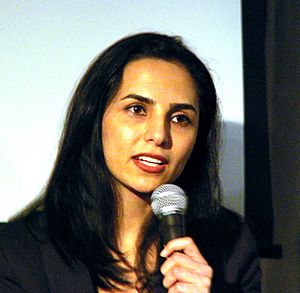Fateme Ekhtesari facts for kids
Quick facts for kids
Fateme Ekhtesari
|
|
|---|---|

Ekhtesari in 2018
|
|
| Native name |
فاطمه اختصاری
|
| Born | Fateme Ekhtesari 1986 (age 38–39) Kashmar, Iran |
| Occupation |
|
| Language | Persian |
| Nationality | Iranian, Norwegian |
| Education | Midwifery |
| Genre | Postmodern Ghazal |
|
|
|
Fateme Ekhtesari (born in 1986) is a talented poet from Iran. She writes her poems in the Persian language. In 2013, she attended a poetry festival in Gothenburg, Sweden.
After returning to Iran, she faced some challenges because of her writing. She was held for a short time and later released. In 2015, she was told she would face a long prison sentence and other punishments. This was because her poems were seen as going against the government and its rules.
About Fateme Ekhtesari
Fateme Ekhtesari was born in 1986 in Kashmar, Iran. She later lived in Karaj. She is known for her unique style of poetry, especially a type called Postmodern Ghazal.
Besides writing poems, she has also worked as a songwriter and a critic. She studied midwifery, which is about helping people during childbirth.
Her Journey as a Poet
Fateme Ekhtesari's first collection of poems was published in 2010. Its name in Persian is Yek bahse feministi ghabl az pokhtane sibzaminiha. However, this book was later taken back. This happened because she had added some words by hand to fill in parts that were censored.
Censorship means that some parts of a book or other work are removed or changed. This is done because they are not allowed by the government or other authorities.
Her second book of poems, Rakhs roye sime khardar, is still waiting. As of October 2015, it had not yet been approved by the Iranian government to be published.
Working with Others
Fateme Ekhtesari was also the main editor for a magazine called Hamin farad bud. This magazine focused on postmodern ideas, but it is no longer published.
She also took part in a special project. It was called En motståndsrörelse på mitt skrivbord. In this project, six Persian poets and six Swedish poets met and shared their work. A magazine called Kritiker wrote about this meeting in 2013.
Some of Ekhtesari's poems have even been used in songs. The rapper Shahin Najafi used her poems in his music. Shahin Najafi's music is not allowed in Iran.
Finding Safety
In January 2016, Fateme Ekhtesari shared important news. She told the Associated Press that she had left Iran. She did this for her safety. She chose not to share many details about how she left.

